- Home
- Lois Lowry
A Summer to Die Page 6
A Summer to Die Read online
Page 6
Will Banks is very kind to Molly. He comes to the house three evenings a week to work in the darkroom, and he always brings something for her: a library book to read, or a candy bar, some little thing like that. One night he brought a handful of pussy willows that he had found behind his house: the first ones of spring, and Molly was thrilled. It was the first time I'd seen her really happy about something for a long time.
"Oh, Will," she said softly, "they're beautiful." She held them against her cheek and rubbed the softness like a kitten. We were sitting in the kitchen, and I took a small vase and ran some water into it.
"No water, Meg," said Will. "If you put pussy willows in water, they'll blossom and then die. Just put them in the vase alone, and they'll stay beautiful forever."
There's so much I don't know. I gave Molly the vase, without water, and she arranged the pussy willows in it; she took them up to our room and put them on the table beside her bed. That night, after we were in bed and Molly was already asleep, I looked over, and the moonlight was across the table and across Molly; behind her, on the wall, was the shadow of pussy willows.
It's not surprising that Will knows so much about so many things, because he has an incredible memory. When we began working together in the darkroom, I showed him, first, the basic procedures for developing film. I only showed him once. Then he did it himself, developing a toll that he had shot of his truck and his dog, using his own camera to make sure it was working properly before he gave it to me. He remembered everything: the temperatures, the proportions of chemicals, the timing right down to the second. His negatives were perfect. The pictures weren't great, because, as he said, he'd been "just fooling around, wanting to get the feel of the camera again," but they were technically perfect, developed exactly right.
And he's immensely curious. When I could see that he'd learned to develop film properly, I wanted to go on to the next step: printing the pictures. But Will said, "Wait. What would happen if, when I was developing the film, I purposely made the chemicals too warm? What would happen if I agitated them less? Or more? And what if I had underexposed the film, Meg, when I took the pictures? Couldn't I compensate for that when I developed the film, maybe by prolonging the developing time?"
I thought for a minute. Those things had never occurred to me, and they should have. Of course you could compensate.
"I never tried," I said, thinking. "But I bet you could. There must be a book that tells how. Let me—"
He interrupted me. He's also impatient, I've found, and very independent. "Oh, the heck with books, Meg. Let's figure it out for ourselves. Let's experiment. Someone must have figured it out once, in order to write a book. Why can't we do the same thing?"
So we did. That was a Monday night, and on Tuesday and Wednesday, each of us shot several rolls of film, purposely underexposing and overexposing them. On Wednesday night we developed them, each one a different way. We changed the temperatures on some, the developing time on some, the amount of agitation on some. And we did it! We figured out exactly how to compensate for all sorts of things, how to build up contrast, how to reduce it. We felt like a couple of miracle workers.
When we came out of the darkroom after three hours, Mom was in the kitchen, working on her quilt. She looked up and laughed. "You two sounded like a couple of crazy people in there," she said, "shouting at each other."
I giggled. We had been shouting. "Don't leave it in the developer so long, you moron!" I had shouted at Will. "You'll ruin it!"
"I'm trying to ruin it!" Will had bellowed back. "So I can figure out how to do it perfectly! How can you learn anything if you won't take risks?"
And I was supposed to be teaching him.
"Lydia," Will explained to Mom that night, sitting down to have a cup of tea before he went home, "genius disregards the boundaries of propriety. Genius is permitted to shout if shouting is productive."
Mom laughed again and snipped off the thread as she completed a red-and-white-striped square from a sunsuit I wore when I was three years old. She likes Will. "Well," she said, "I've been living with creative genius long enough that I should know that by now. Charles has been known to shout at his typewriter, if you can believe that."
Will nodded very seriously, chewing on the stem of his pipe. "Oh my, yes. It would be necessary to shout at one's typewriter now and then, I would think. Machinery needs that kind of discipline occasionally. Just today I was shouting at my truck radiator."
Mom was smiling as she measured off a new square in the quilt. It was good to see her relaxed and smiling, the way she used to be, for a change. "How about your homework, Meg?" she asked. "You're not disregarding the boundaries of your homework too, are you?"
I groaned. But I'm keeping up with school, same as always. Suddenly, though, algebra and American history seem pretty dull compared to other things that are happening. I'll be glad when the term ends next month so that I can spend more time on photography. Molly will be completely well by then, too, and things will be easier. And I'll be able to see a lot of Ben and Maria.
Will took me to meet them just after they moved in. Molly came, too; I was surprised that she wanted to, because she's been so miserable and self-conscious about the way she looks that mostly she stays in our room. But when I asked her, she said what the heck, there wasn't anything better to do.
The three of us walked across the field on a hot, sunny Saturday afternoon that smelled like new growing things. We could have gone down the road, of course, but it seemed like the sort of day when walking across a field would be a nice thing to do. Wild flowers were just beginning to appear. They always take me by surprise. It seems, each year, as if winter will go on forever, even back in town. Then when you've resigned yourself to a whole lifetime of grayness, suddenly bright bursts of yellow and purple and white spring up in the fields, and you realize they've been hiding there all along, waiting.
Will was carrying a heavy stick that he sometimes uses when he's walking, especially in the rocky fields. He pointed here and there with the stick, at the little blossoms in the field and the shady border of the woods, as we walked along.
"Anemonella thalictroides, Cerastium arvense, Cornus canadensis, Oakesia sessilifolia," he said. Molly and I glanced at him, grinned at each other, and didn't say anything.
"Uvularia perforata," Will went on, pointing with his stick to a light yellow, tiny, bell-shaped flower.
"Can you say that three times fast?" asked Molly, laughing.
"Yes," grinned Will back at her.
Suddenly I decided that he was really putting us on. "You're making all that up, Will!" I hooted. "You big phony! You had me fooled for a minute, too!"
He looked down his nose at me in a haughty sort of way, but his eyes were twinkling.
Then he pushed aside some underbrush with his stick, and pointed to a clump of small purple flowers. "Viola pedata," he said, talking to Molly, ignoring me. "So called because the leaves resemble the foot of a bird. You believe me, don't you, Molly?"
Molly was laughing. The sun was shining through her thin hair, and for the first time since she'd been sick, there was color in her cheeks. "I don't know for sure, Will," she smiled. "I think I believe you, but the only wild flower I recognize is goldenrod."
He nodded. "Solidago," he said. "Very common around here, a remarkable plant. But we won't see it bloom until the end of July. In the meantime, you should investigate some of these others, Molly. It would keep you busy until you can go back to school, and it would be good for you, being in the fresh air."
Molly shrugged. She didn't like being reminded of her problems. We walked on.
Ben and Maria were behind the house, starting a garden. They had a patch of ground dug up, and Ben was standing in the middle of the turned earth, chopping at the lumps with a hoe. There was sweat all over his bare back—he wasn't wearing anything but faded, patched jeans—and even though there was a handkerchief tied around his head, his hair and beard were wet with sweat too. He smiled when he saw us
.
"Ah, saviors!" he called. "You're coming to rescue me from this slave labor, right?"
"Wrong," called the girl who was sitting in the grass at the corner of the garden patch. "No rescue! I want to get my peas planted. Hi, Will!"
I burst out laughing. Will had told me very casually that there seemed to be a baby coming. That was the understatement of the year. Sometimes I forget that Will is seventy years old, and that he's a little shy about some things. Maria was so thoroughly pregnant that I thought we would do well to start boiling water immediately.
She was sitting with her legs crossed, and her middle was resting on her knees. She was wearing a man's shirt with the sleeves ripped out; her arms were bare and very tan, the same as her legs. The shirt was buttoned around her, but just barely; the middle button was pulled sideways by her stomach, and it was going to pop off very soon. I hoped she had a bigger shirt ready; either that, or that the baby would be born before long. It looked like it was going to be a race between the baby and the button, and I didn't know enough about either pregnancy or the art of mending to be able to predict which was going to detach itself first.
Maria had one long dark braid down her back, and a smile that included all three of us, as well as Ben, who was still leaning on his hoe.
"I'd like you to meet my two friends, Meg and Molly Chalmers," Will said. "Meg is the photographer I've been telling you about. And Molly is the cheerleader, but I'm going to try to turn her into a botanist. Girls, this is Ben Brady. And Maria."
Maria reached up to shake our hands, and said, "Maria Abbott." Out of the corner of my eye I could see Will flinch slightly. It all went right over Molly's head. She was so interested in the baby.
"When is the baby due?" asked Molly. "Do you mind my asking? I just love babies."
From the garden, where he had started to hack at a clod of earth that obviously had a rock in the middle of it, Ben looked up and chuckled. He rolled his eyes. "Does she mind your asking? Prepare yourself, Molly, for an hour ... two hours, three hours ... of conversation. That's all she talks about! I remember a time—it wasn't so long ago, either, come to think of it—when Maria and I used to talk about books. Music. The weather. Politics. Little things like that. Now we sit down in the evening after supper, and we pour a couple cups of tea, put some Beethoven on the stereo, and talk about diapers." He groaned, but he was looking at Maria affectionately.
We were all laughing, even Maria. She threw a handful of weeds at him lightly, and said, "Just hoe your row, Daddy. Molly, come in the house with me. I'll show you the cradle I've been refinishing."
She got to her feet awkwardly, and, standing, said, "Look!" She smoothed the shirt over her middle so we could see how round she was. "It isn't due until July. Can you believe that? It's incredible how big I am, but I'm sure July is right. Do you know how you figure out your due date? It's really easy. You add seven days to the date that your last period started, and—"
I started talking quickly to Will, because I could see how embarrassed he was by the conversation. Maria and Molly went in the house, and Ben put down the hoe. He showed Will and me how he had hauled rocks from the field to make a small wall beside the driveway, and the work he'd been doing on the roof. We wandered around for a long time, talking about what needed to be done to the old house; Will explained how things had been when he was a child, and Ben thought of how to make them that way again. We stood, finally, by a bare patch of earth beside the kitchen door, and Will described the flowers that had been there once, how his grandmother had emptied her dishwater there, over the flowers, and they had grown bigger and healthier than the other plants.
"Of course!" said Ben. "It probably had little scraped-off bits of food, organic stuff, in it. She was mulching the flowers without even realizing it. That's cool; that's really cool. We should try that. I bet we could grow herbs there; Maria's dying to have an herb garden. 'Parsley, sage, rosemary, and thyme,'" he sang, off-key.
Will looked somewhat nonplused by Ben, Maria, the whole thing. But he liked them; I could tell. And he was happy about the house; I could tell that, too.
Maria made iced tea for everyone, and we went inside. The house was furnished with odds and ends of things, most of them with the paint partly removed. Maria was busy refinishing everything. There was an old spinning wheel, and she said she was going to learn to spin. The cradle, which was almost finished. A rocking chair, partly done, with a pile of sandpaper on the seat. Ben's typewriter and books stood on a desk made from an old door balanced on two sawhorses. Will sat down in the only real chair, a big comfortable one with its stuffing popping out like milkweed from the pods in fall.
"Hope no one has hay fever," laughed Maria as Will sat down. "Every time anyone sits in that chair, feathers and dust fly all over the room. But I'm going to reupholster it after the baby's born."
Ben groaned. "She's gone mad, really mad," he teased. "I live in constant fear that some morning I'll wake up and find that she's sanded and scrubbed and peeled and painted me in the night!"
Maria leaned over and examined his bare foot. "Come to think of it," she mused, "that's not a bad idea. You could use a little work." Then she leaned her head for a moment against his blue-jeaned leg, and he rumpled the top of her hair with his hand.
I didn't say much. I was very happy, being there. The sun had gotten lower in the sky, and as it came through the windows it fell on Maria as she sat there on the floor leaning against Ben, in gold patterns on her shoulders and the thick braid of hair. I was making a photograph in my mind.
But Molly chattered on and on. It was good to hear her; all the tenseness and anger were gone. She and Ben and Maria talked about what the inside of the house needed: hanging plants in the sunny windows; fresh white paint on the old plaster walls; just the right kind of curtains. "I'll weave them myself!" Maria exclaimed; Ben sighed, smiled, and stroked her head.
On the way home, Molly lagged behind Will and me. She was gathering wild flowers, one of each kind. She said she'd press them, and Will told her he would help her to identify each one, that he had a book she could use.
"You know," I said slowly to Will, as we walked back through the field together, "I wish I were more like Molly. I mean, I wish I knew the right things to say to people. Sometimes I seem to just sit there."
"Meg," Will said, and he put his arm around me as we walked, "do you see that section of the woods over there, where the spruce tree is beside the birches?"
"Yes," I said, looking where he pointed.
"Not far into the woods, beyond the spruce, at the right time of year, there's a clump of fringed gentians. Have you ever seen a fringed gentian?"
How do you like that? When I said something really serious, really personal, for pete's sake, to my best friend, he wasn't even listening. He was still thinking about his plants.
"No," I told him, a little sarcastically. "I've never seen a fringed gentian."
"It will be after you've moved back to town," he said. "It won't bloom until the end of September, maybe even October. But I want you to come back, so I can show it to you."
"Okay," I sighed. I didn't care about his old fringed gentian.
"It's important, Meg," Will said. "You promise?"
Well, if it was important to him, all right. I would want to come back, anyway, and I didn't mind looking at his flower. Maybe he wanted to photograph it or something.
"I promise, Will," I said.
7.
Finally Molly has stopped being a grouch. It was gradual, and I'm not even sure the change is a good one. She hasn't gone back to being the old Molly she was before she was sick. She isn't giggly, funny Molly anymore, full of smiles and ideas and silly enthusiasms.
I don't know what she is, now. A stranger, mostly. It's as if she has become part of a different world, one that doesn't include me anymore, or even Mom and Dad. She's quieter, more serious, almost withdrawn. When I tell her about things that are happening at school, she listens, and asks questions, but it's as
if she doesn't really care much; she's only listening to be polite.
Only a few things interest her now. She spends a lot of time with the flowers. In the past, for Molly, flowers were things to run through in a field, to pick, to bury your nose in, to arrange in a vase on the table. Now, with Will's help, she's learning about them; she reads the books he's brought to her, and identifies the wild flowers she's found in the fields. She classifies them, labels them, arranges them in order in a book that she's putting together. It takes most of her time. She's very careful, and very serious, about her flowers. We don't dare, ever, to tease her about them.
It's as if she has become, suddenly, old.
The other thing that still interests her is the baby. She visits Maria often, and they talk and talk about the baby. Molly is helping Maria to make clothes for it; they sew together, and when she finishes something, Molly smoothes it with such care, folds it neatly, and puts it away in the drawer they're filling with little things.
Even Ben and Maria seem a little puzzled by the concern Molly has for all those tiny nightgowns and sweaters. Once I heard Ben say to her, "Hey, Moll. It's already going to be the best-dressed kid in the valley. Quit sewing for a while, will you? Come with me to see if we can find some wild strawberries."
But Molly just smiled at him and shook her head. "You go ahead, Ben," she said. "Take Meg. I want to finish this. I want everything to be perfect when the baby comes."
Ben groaned. "Molly, don't you know what babies are like? It's just going to pee on those clothes. Why do they need to be perfect with that kind of future in store for them?"
Molly smiled at him and went on stitching.
And sometimes, for no reason, Molly is like a baby, herself. One night after supper, when it was raining outside, we were sitting in front of the fireplace. Mom was working on the quilt, Dad was reading, and Molly and I were just watching the logs shift and send sparks into the chimney as they burned. We had our pajamas on.

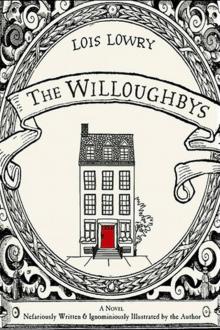 The Willoughbys
The Willoughbys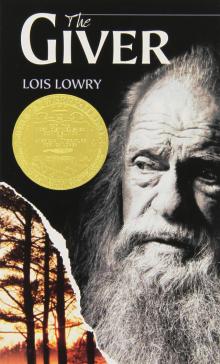 The Giver
The Giver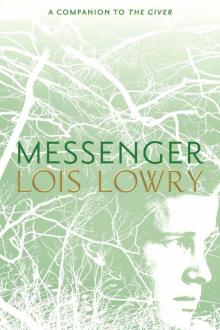 Messenger
Messenger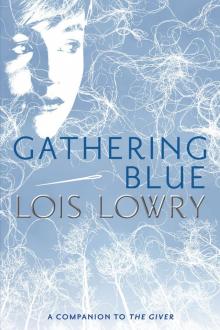 Gathering Blue
Gathering Blue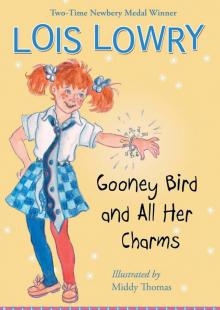 Gooney Bird and All Her Charms
Gooney Bird and All Her Charms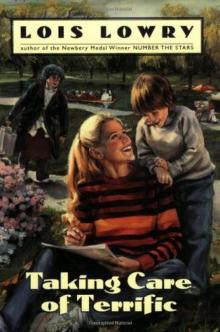 Taking Care of Terrific
Taking Care of Terrific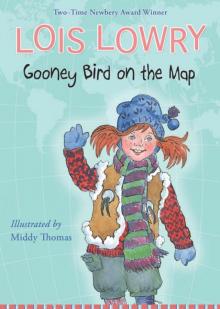 Gooney Bird on the Map
Gooney Bird on the Map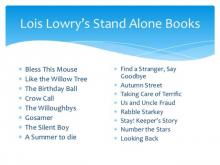 The Birthday Ball
The Birthday Ball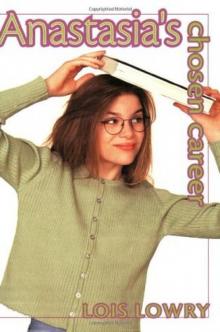 Anastasia's Chosen Career
Anastasia's Chosen Career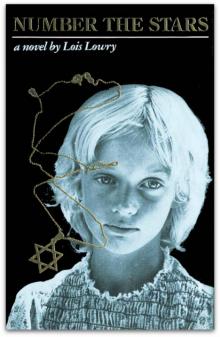 Number the Stars
Number the Stars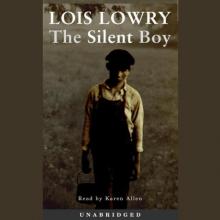 The Silent Boy
The Silent Boy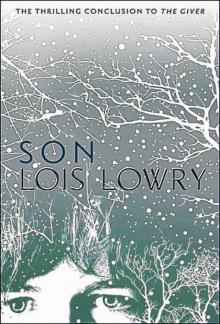 Son
Son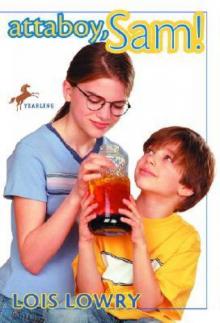 Attaboy, Sam!
Attaboy, Sam!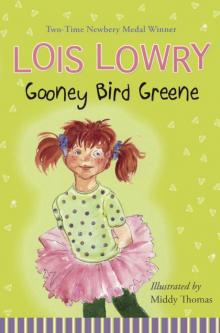 Gooney Bird Greene
Gooney Bird Greene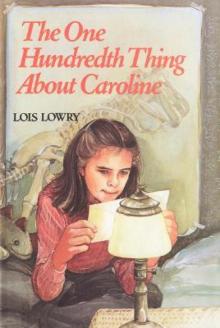 The One Hundredth Thing About Caroline
The One Hundredth Thing About Caroline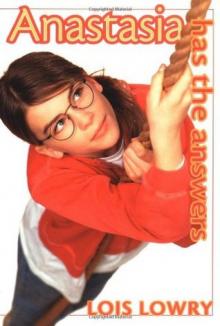 Anastasia Has the Answers
Anastasia Has the Answers Your Move, J. P.!
Your Move, J. P.!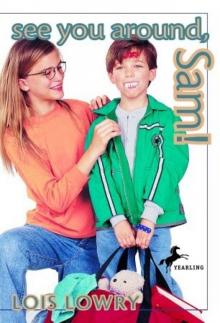 See You Around, Sam!
See You Around, Sam!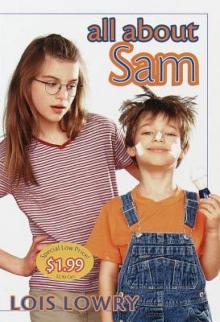 All About Sam
All About Sam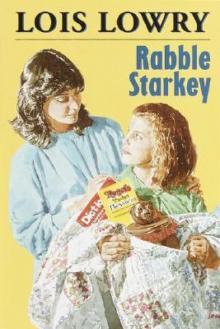 Rabble Starkey
Rabble Starkey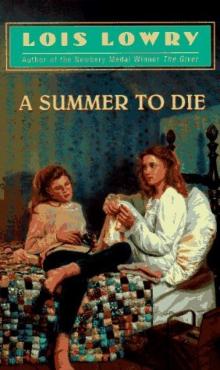 A Summer to Die
A Summer to Die Anastasia at This Address
Anastasia at This Address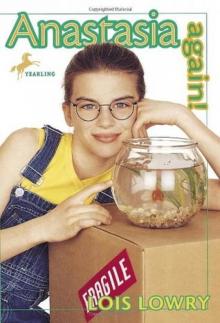 Anastasia Again!
Anastasia Again!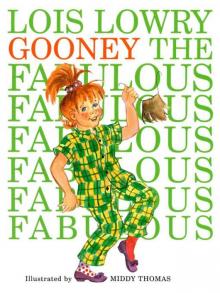 Gooney the Fabulous
Gooney the Fabulous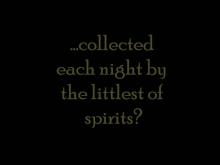 Gossamer
Gossamer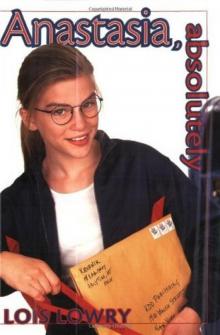 Anastasia, Absolutely
Anastasia, Absolutely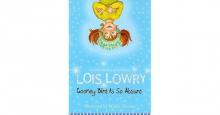 Gooney Bird Is So Absurd
Gooney Bird Is So Absurd Anastasia at Your Service
Anastasia at Your Service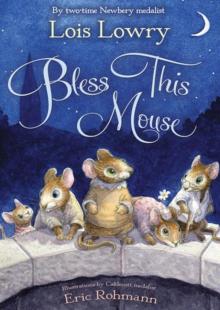 Bless this Mouse
Bless this Mouse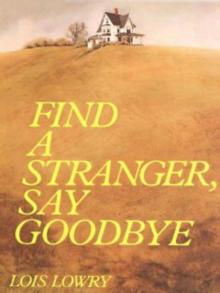 Find a Stranger, Say Goodbye
Find a Stranger, Say Goodbye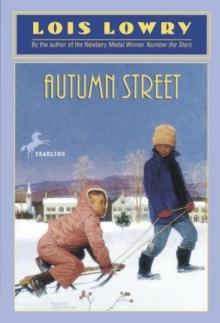 Autumn Street
Autumn Street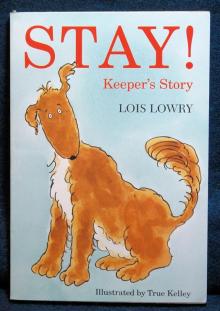 Stay Keepers Story
Stay Keepers Story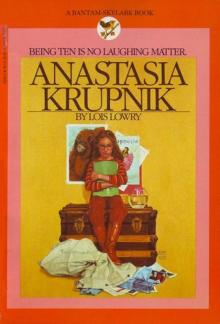 Anastasia Krupnik
Anastasia Krupnik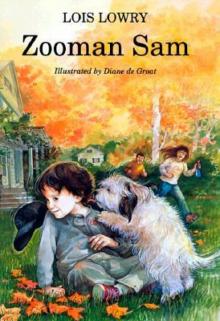 Zooman Sam
Zooman Sam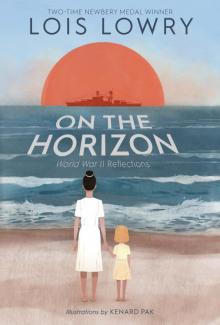 On the Horizon
On the Horizon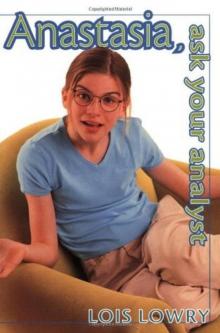 Anastasia, Ask Your Analyst
Anastasia, Ask Your Analyst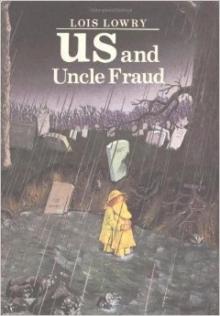 Us and Uncle Fraud
Us and Uncle Fraud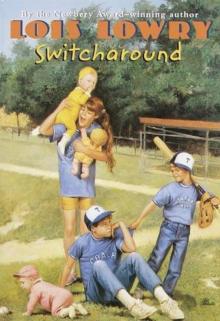 Switcharound
Switcharound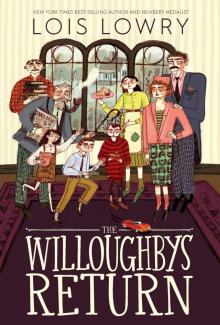 The Willoughbys Return
The Willoughbys Return Dear America: Like the Willow Tree
Dear America: Like the Willow Tree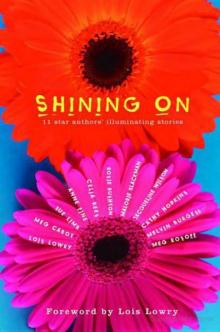 Shining On
Shining On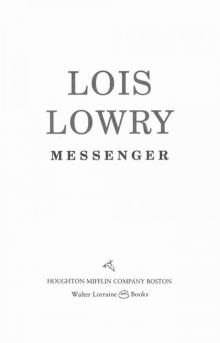 Messenger (The Giver Trilogy)
Messenger (The Giver Trilogy)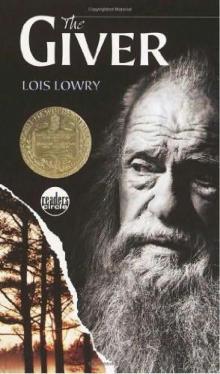 Giver Trilogy 01 - The Giver
Giver Trilogy 01 - The Giver